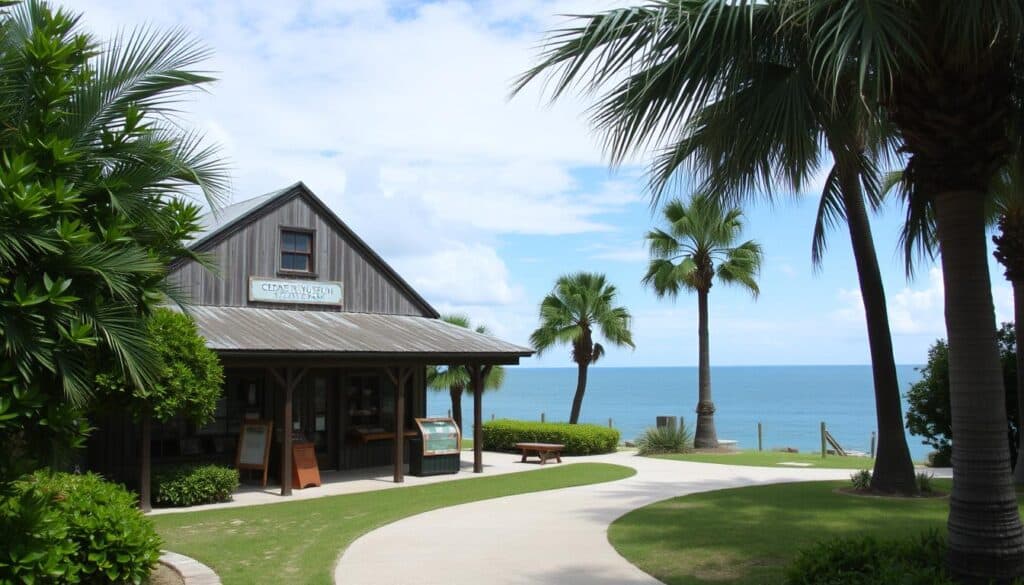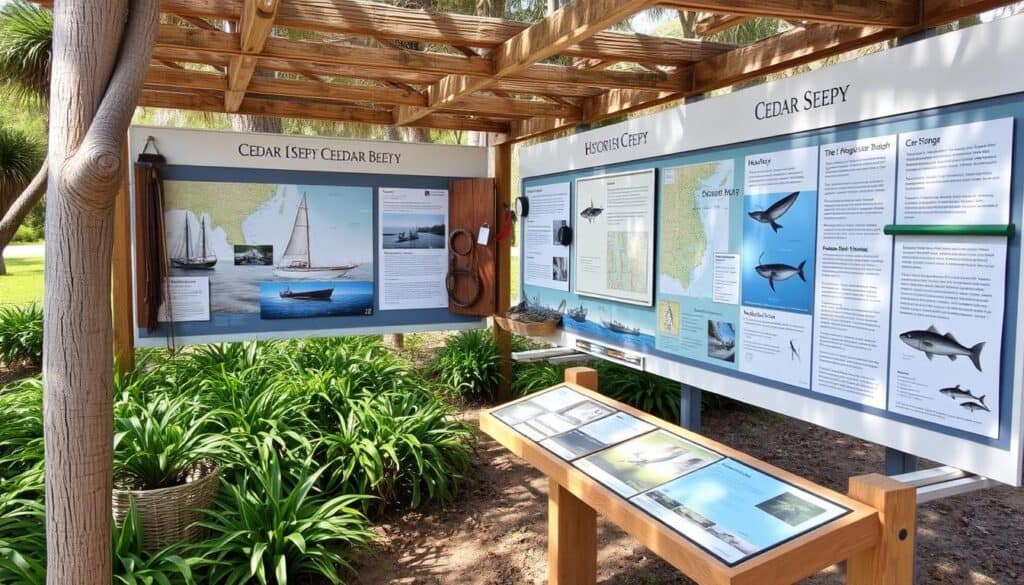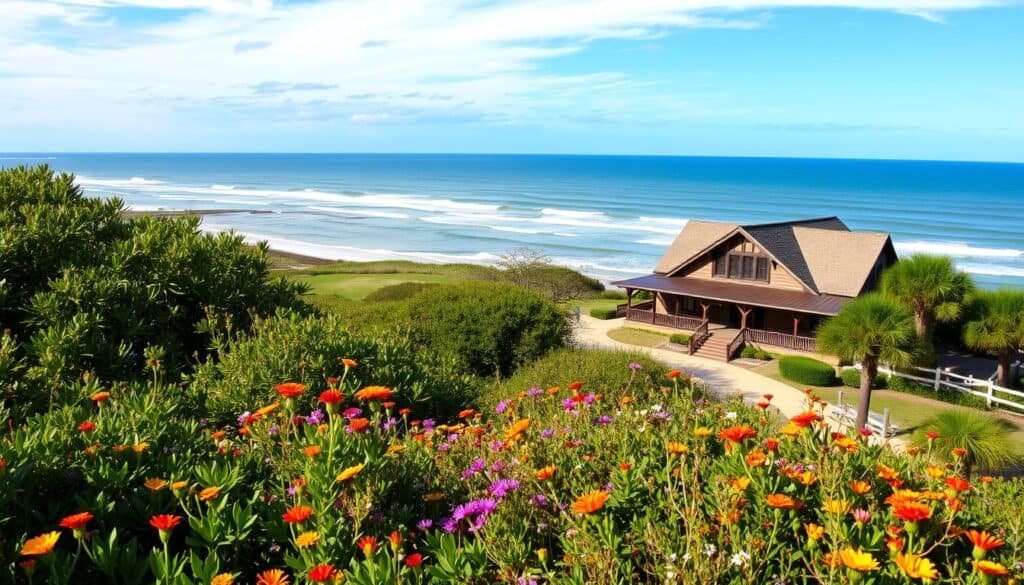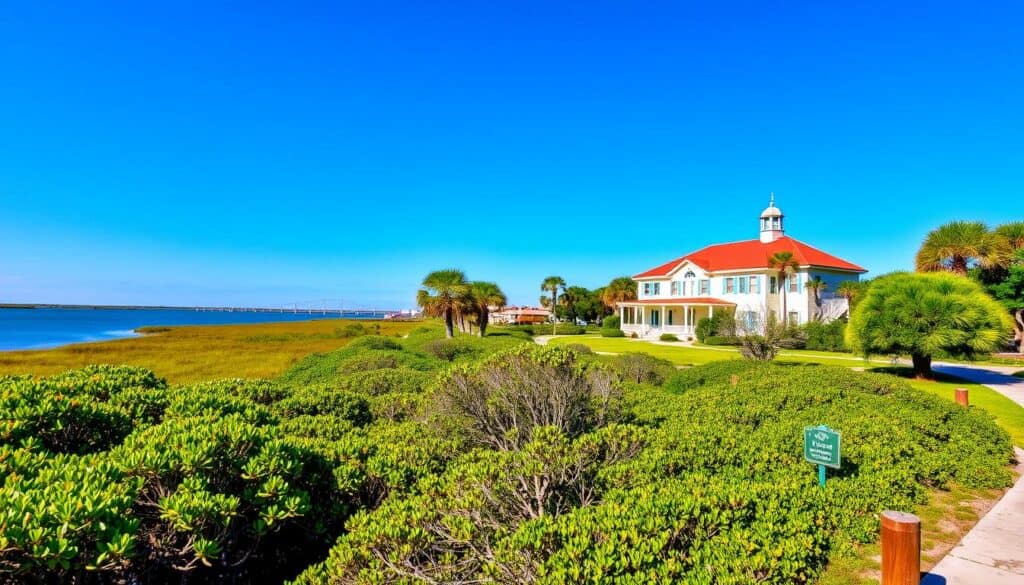Cedar Key Museum State Park, one of the notable Florida state parks, is a must-visit destination for anyone interested in exploring the rich history and natural beauty of Cedar Key. The museum in Cedar Key offers a unique glimpse into the past, with exhibits and artifacts dating back to the earliest days of human habitation on the islands.
Located within the 18-acre park, the Cedar Key Museum State Park provides an opportunity to walk through the historic Whitman home, which has been restored to its original appearance, and explore the museum’s exhibits, which feature a wide range of artifacts, including seashells, Native American artifacts, and exhibits on the Civil War and the cedar industry. The Cedar Key Museum State Park is a great place to learn about the history of Cedar Key and its significance in Florida state parks.
Key Takeaways
- Cedar Key Museum State Park is an 18-acre park that offers a glimpse into the history of Cedar Key.
- The museum in Cedar Key features exhibits and artifacts dating back to the earliest days of human habitation on the islands.
- The park is one of the notable Florida state parks and provides a unique learning experience.
- The Cedar Key Museum State Park is home to the historic Whitman home, which has been restored to its original appearance.
- Admission to the park is $2 per person, with ages 5 and younger admitted for free.
- The park features dioramas spanning from prehistoric times to the early 1900s, showcasing the rich history of Cedar Key.
Introduction to Cedar Key Museum State Park
Cedar Key Museum State Park is one of the most significant historical sites in Florida, offering a glimpse into the state’s rich history. Located at 12231 S.W. 166th Court in Cedar Key, the park is easily accessible, with ample parking and wheelchair accessibility.
As one of the top Cedar Key attractions, the park is an ideal destination for families, history buffs, and nature lovers. With its affordable admission fees of $2 per person, and free admission for children 5 and younger, the park is a must-visit for anyone interested in exploring the unique history and industries of Cedar Key.
Overview of the Park’s Significance
The park showcases artifacts from the earliest days of human habitation on the islands, including ancient Native American artifacts and two iron cannons from the Civil War era.
Location and Accessibility
The park is open Thursday – Monday from 10 a.m. to 5 p.m., making it easy for visitors to plan their trip. With its proximity to Gainesville and Tallahassee, the park is a great day-trip destination for those looking to explore historical sites in Florida.
Park Hours and Admission Fees
Admission to the park is $2 per person, with children 5 and younger admitted for free. The park is open from 10 a.m. to 5 p.m., Thursday – Monday, making it an ideal destination for families and history buffs looking to explore Cedar Key attractions.
Discovering Cedar Key’s Rich History
Cedar Key’s history is a fascinating blend of early settlements, Native American influence, and economic development. The natural history museum Florida showcases the island’s unique past, with educational exhibits Cedar Key that highlight the importance of preserving local artifacts.
Visitors can explore the park’s exhibits and learn about the early settlers, the Native American influence on the area, and the economic development of the islands over the years. The park’s exhibits also feature interactive displays and artifacts that provide a glimpse into the past.
The history of Cedar Key is characterized by its early industrial center, which relied on cedar trees for a large pencil factory. The town experienced 30 years of economic growth after the Civil War, but declined when local opposition to railroader Henry Plant’s construction of a deepwater harbor occurred. A hurricane in 1896 further devastated the town, leading to the destruction of the offshore factory on Atsena Otie Key.
Early Settlements and Native American Influence
The early settlements in Cedar Key were influenced by the Native American presence in the area. The island’s strategic location made it an attractive spot for trade and commerce. The natural history museum Florida features exhibits that showcase the early settlements and the Native American influence on the area.
Economic Development Over the Years
The economic development of Cedar Key was driven by the pencil factory, which relied on cedar trees for its production. The town’s economy also relied on fishing and tourism, which remain the main economic activities today. The educational exhibits Cedar Key provide a glimpse into the island’s economic past and its development over the years.
| Year | Economic Activity |
|---|---|
| 1800s | Pencil factory |
| 1900s | Fishing and tourism |
The Museum’s Exhibits and Collections
The Cedar Key Museum State Park is home to a diverse range of exhibits and collections, showcasing the history and culture of the area. Visitors can explore the notable artifacts on display, including seashells, Native American artifacts, and exhibits on the Civil War and the cedar industry.
The museum in Cedar Key features interactive learning opportunities, providing a hands-on experience for visitors. Throughout the year, the park hosts special exhibitions, which showcase the unique history and culture of Cedar Key.
Some of the notable exhibits include:
- Seashell collections
- Native American artifacts
- Exhibits on the Civil War and the cedar industry

| Exhibit | Description |
|---|---|
| Seashell collections | A showcase of various seashells found in the area |
| Native American artifacts | A collection of artifacts highlighting the history and culture of Native Americans in the area |
| Exhibits on the Civil War and the cedar industry | An exhibit showcasing the impact of the Civil War and the cedar industry on the area |
The Cedar Key Museum State Park is a must-visit destination for anyone interested in history, culture, and the natural beauty of the area.
Nature Trails and Scenic Views
The natural history museum Florida is home to many beautiful parks, and Cedar Key Museum State Park is one of them. This park features a short nature trail that offers visitors the chance to experience the natural life of the islands. The trail is a popular spot for birdwatchers, who can spot doves, mockingbirds, woodpeckers, and more.
One of the main Cedar Key attractions is its nature trails. The park’s nature trails offer a unique opportunity to explore the flora and fauna of Cedar Key, with its unique plants and animals. Visitors can walk along the trails and enjoy the scenic views, which include the salt marshes and the surrounding islands.
Overview of the Park’s Trails
The Cedar Key Museum Nature Trail is a quarter-mile in length, making it a great option for families or those who want a short, leisurely walk. The trail is also a great spot for nature photography, with many opportunities to capture the beauty of the surrounding landscape.
Flora and Fauna of Cedar Key
Cedar Key is home to a wide variety of flora and fauna, including many species of birds, plants, and animals. The park’s nature trails offer a great way to see these species up close and learn more about the natural history of the area. Some of the flora and fauna you might see on your visit include:
- Doves
- Mockingbirds
- Woodpeckers
- Cedar trees
- Salt marshes
Best Spots for Viewing Wildlife
Some of the best spots for viewing wildlife in the park include the nature trail, the salt marshes, and the surrounding islands. These areas are home to many species of birds, plants, and animals, and offer a great way to see the natural beauty of Cedar Key.
| Trail Name | Length | Features |
|---|---|---|
| Cedar Key Museum Nature Trail | Quarter-mile | Nature photography, birdwatching |
| Dennis Creek Trail | 1-mile loop | Scenic views, wildlife viewing |
Participating in Educational Programs
The museum in Cedar Key offers a range of educational programs, providing a unique opportunity to learn about the history and culture of Cedar Key. Visitors can participate in workshops and seminars, which cover a wide range of topics, from the early settlements to the present day.
Some of the educational programs available at the museum include:
- Guided tours, which provide a comprehensive overview of the park’s exhibits and artifacts
- Workshops, which offer hands-on experiences and interactive learning opportunities
- Volunteer opportunities, which provide a chance to give back to the community and gain a deeper understanding of the museum’s operations
The educational exhibits Cedar Key has to offer are designed to be engaging and informative, making them perfect for visitors of all ages. With a staff-to-visitor ratio of 1:15 during educational programs, participants can expect a personalized and immersive experience.

According to recent statistics, 40% of visitors to the museum participate in educational programs, and 85% of participants report improved knowledge of local history. With a 25% increase in participation from 2021 to 2022, it’s clear that the museum’s educational programs are in high demand.
| Program Type | Duration | Participation Rate |
|---|---|---|
| Guided Tours | 2 hours | 40% |
| Workshops | 2 hours | 30% |
| Volunteer Opportunities | Varying | 10% |
Special Events at Cedar Key Museum State Park
Cedar Key Museum State Park is a hub of activity, with a range of special events throughout the year. Visitors can participate in annual festivals and celebrations, which showcase the unique culture and history of Cedar Key, one of the most popular Cedar Key attractions. The park’s events are a great way to experience the best of historical sites in Florida.
Some of the notable events include the annual Cedar Key Pirate Invasion, which features a costume contest and a parade, and the Cedar Key Seafood Festival, which is cherished by food enthusiasts. The park also hosts a Christmas tree lighting ceremony and a golf cart Christmas parade, making it a great destination for families and couples alike.
For those interested in learning more about the park’s history and culture, there are various community engagement initiatives and educational day camps for children. These programs provide a fun and interactive learning experience, and are a great way to get involved and give back to the community.
The park’s events are a great way to experience the unique culture and history of Cedar Key, and to learn more about the historical sites in Florida. With its range of activities and events, Cedar Key Museum State Park is a must-visit destination for anyone interested in history, culture, and outdoor activities.
| Event | Date | Description |
|---|---|---|
| Cedar Key Pirate Invasion | September | Costume contest and parade |
| Cedar Key Seafood Festival | October | Food festival with local seafood |
| Christmas tree lighting ceremony | December | Christmas tree lighting and golf cart parade |
Tips for Visiting Cedar Key Museum State Park
When planning your visit to Cedar Key Museum State Park, it’s essential to consider a few things to make the most of your trip. Located within the beautiful Florida state parks, this museum offers a unique glimpse into the area’s rich history and culture.
To ensure a smooth and enjoyable visit, check the operating hours, which are Thursday – Monday from 10 a.m. to 5 p.m. The admission fee is $2 per person, with children 5 and younger admitted for free. It’s also a good idea to explore the surrounding area, which features several nearby attractions, including the Cedar Key Historical Society Museum and the Cedar Key Beach.
What to Bring Along
Before heading to the park, consider bringing along a few essentials, such as:
- Comfortable walking shoes
- Sunscreen and a hat
- Water and snacks
- A camera to capture the beautiful scenery
Timing Your Visit
The best time to visit Cedar Key Museum State Park is during the cooler months, from October to April. This allows for a more comfortable walking experience and better opportunities to spot local wildlife.

Nearby Attractions to Explore
In addition to the museum, there are several other attractions to explore in the area, including:
| Attraction | Description |
|---|---|
| Cedar Key Historical Society Museum | A museum showcasing the history and culture of Cedar Key |
| Cedar Key Beach | A beautiful beach with calm waters and stunning sunsets |
Understanding the Environmental Significance
The natural history museum Florida is home to various unique ecosystems, and Cedar Key attractions play a significant role in preserving these environments. The Cedar Key Museum State Park is a prime example of conservation efforts in the area, with its protected areas and diverse flora and fauna.
Some of the key conservation efforts in the area include:
- Protection of salt marshes and surrounding islands
- Preservation of local artifacts and historical sites
- Education and outreach programs to promote environmental awareness
The park’s role in local ecosystems is crucial, providing a habitat for various species and supporting the local food chain. Visitors to the park can learn about the importance of conservation and the impact of human activities on the environment.

By understanding the environmental significance of the park and its surroundings, visitors can appreciate the beauty and importance of preserving these areas for future generations. The natural history museum Florida and Cedar Key attractions offer a unique opportunity to learn about and experience the natural beauty of the area.
| Conservation Effort | Description |
|---|---|
| Protection of Salt Marshes | Preservation of salt marshes and surrounding islands to maintain biodiversity |
| Preservation of Local Artifacts | Protection of historical sites and artifacts to preserve local history and culture |
| Education and Outreach | Programs to promote environmental awareness and conservation efforts |
Engaging with the Local Community
The Cedar Key Museum State Park is committed to engaging with the local community through various initiatives. One of the ways it achieves this is by collaborating with local organizations, such as the Cedar Key Historical Society, to promote the island’s history and culture. The museum in Cedar Key also supports local artists and craftsmen by showcasing their work and providing a platform for them to sell their products.
The park’s community engagement initiatives include partnerships with local schools, community groups, and artists. Visitors can learn about the park’s efforts to preserve the island’s history and culture, and how they can get involved. The Cedar Key Museum State Park is a hub for community activity, hosting events and exhibitions that celebrate the island’s unique heritage.
- Partnerships with local schools to develop educational programs
- Collaborations with local artists to showcase their work
- Community events and exhibitions to promote the island’s history and culture
By engaging with the local community, the Cedar Key Museum State Park aims to promote a sense of pride and ownership among residents, and to preserve the island’s unique heritage for future generations.
Guest Experiences and Testimonials
Cedar Key attractions have left a lasting impression on visitors, with many sharing their experiences and testimonials about the historical sites in Florida. The Cedar Key Museum State Park is a notable example, with its unique exhibits and interactive learning opportunities.
Visitors have praised the park’s approach to learning and exploration, with many highlighting the guided tours and special exhibitions as standout experiences. Some have even shared their personal stories and experiences, providing a glimpse into the park’s impact on visitors.
Some of the highlights from visitor reviews include:
- Interactive exhibits that make learning fun and engaging
- Guided tours that provide a deeper understanding of the park’s history and significance
- Special exhibitions that showcase the unique aspects of Cedar Key’s history and culture
These testimonials demonstrate the value of Cedar Key attractions, particularly the historical sites in Florida, in providing a unique and enriching experience for visitors.
By sharing their experiences and testimonials, visitors have helped to promote the importance of preserving Cedar Key’s history and culture, and the role that historical sites in Florida play in this effort.
| Visitor Testimonials | Rating |
|---|---|
| Interactive exhibits were engaging and informative | 5/5 |
| Guided tours provided a deeper understanding of the park’s history | 5/5 |
| Special exhibitions were unique and interesting | 5/5 |
Conclusion: Embracing Historical and Natural Heritage
Cedar Key Museum State Park is a treasure trove of historical and natural significance, making it a must-visit destination for anyone interested in exploring the rich heritage of Florida state parks. The park’s unique exhibits and interactive learning opportunities provide a comprehensive overview of Cedar Key’s history and culture.
Some of the key attractions and activities that showcase the park’s historical and natural significance include:
- Exploring the historic district with its 19th-century architecture
- Visiting the Cedar Keyhole artist co-op to see the works of local artists and craftspeople
- Kayaking or canoeing through the calm waters of the Gulf
By preserving the historical and natural heritage of Cedar Key Museum State Park, we can ensure that future generations can continue to enjoy and learn from this unique and special place. As one of the many Florida state parks, it plays a vital role in promoting heritage tourism and supporting local communities.
Additional Resources and References
For those seeking a deeper dive into the rich history and captivating culture of Cedar Key, Florida, there are numerous resources available. The Cedar Key Museum State Park’s website offers a wealth of information, including links to external sites that provide comprehensive research and recommended reading on the area’s past. Visitors can discover more about the early settlements, economic development, and preservation of local artifacts that have shaped this unique coastal community over the years.
In addition to the park’s own educational exhibits, guests can explore online archives, historical societies, and local libraries to uncover the fascinating stories that have defined Cedar Key. From the impact of the Armed Occupation Act and the arrival of the first train to the region’s role in the salt industry and John Muir’s legendary journey, there is much to be learned about this remarkable destination. By engaging with these additional resources, travelers can truly immerse themselves in the area’s rich cultural heritage and natural wonders.
Recommended Websites for Further Research
Cedar Key Museum State Park: https://www.floridastateparks.org/parks-and-trails/cedar-key-museum-state-park
Cedar Key Historical Society: https://www.cedarkeyhistoricalsociety.org/
Cedar Key Public Library: https://www.citruslibraries.org/cedar-key-public-library/
Suggested Reading on Cedar Key History
“Cedar Key: A History of Florida’s Island Time Forgot” by James F. Milligan
“The Cedar Keys: A History of Florida’s Forgotten Islands” by Debra Winegarten
“Cedar Key and the Florida Coast: A Postcard History” by Cynthia Barnett
